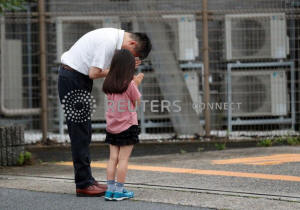'I don't have words': Boss of torched Japan animation studio mourns
bright, young staff
 Send a link to a friend
Send a link to a friend
 [July 20, 2019]
By Tim Kelly and Sam Nussey [July 20, 2019]
By Tim Kelly and Sam Nussey
KYOTO, Japan (Reuters) - Many victims of an
arson attack on a Japanese animation studio were young with bright
futures, some joining only in April, the shaken company president said
on Saturday, as the death toll climbed to 34.
Thursday's attack on Kyoto Animation, well known for its television
series and movies, was Japan's worst mass killing in two decades. It was
all the more poignant because of the youth of the victims in a country
where the population is among the world's oldest.
Many of the victims of the attack, in the ancient capital of Kyoto, were
young women, company president Hideaki Hatta said.
"Some of them joined us just in April. And on the eighth of July, I gave
them a small, but their first, bonus," he said.
"People who had a promising future lost their lives. I don't know what
to say. Rather than feeling anger, I just don't have words," Hatta said.
Fifteen of the victims were in their 20s and 11 were in their 30s,
public broadcaster NHK said. Six were in their 40s and one was at least
60. The age of the latest victim, a man who died in hospital, was not
known.
The names of the victims have not been disclosed yet to wait for
definitive identification.

Police have confirmed the identity of the suspect as Shinji Aoba,
ex-convict of a shop robbery, but have not formally arrested him as he
is being treated for heavy burns.
It is unusual for the police to release a suspect's name before making
an arrest.
PLAGIARISM CLAIM
Aoba lives in a modest, two-floor apartment building 500 km (310 miles)
from Kyoto in a rural suburb just outside Omiya, a commuter hub north of
Tokyo.
A 27-year-old neighbor said Aoba had once grabbed him and yelled at him
over a noise dispute.
"He started yelling at me to my face to shut up. He grabbed me by the
collar and started pulling my hair. It was terrifying," the neighbor,
who declined to be identified, said.
Aoba is suspected of carrying out the arson attack because he believed
his novel had been plagiarized, local media says.
But Hatta said he had no idea about any plagiarism claim, adding he had
not seen any correspondence from the suspect.
People living near the studio said they saw a man fitting Aoba's
description in a park the day before the attack. Police suspect he may
have spent a day or more in the area to prepare.
Resident Rie Bannai said her nephew saw the man sleeping on a bench in
the park.
[to top of second column]
|

People pray for victims of the torched Kyoto Animation building in
Kyoto, Japan, July 20, 2019. REUTERS/Kim Kyung-Hoon

Rui Yamaguchi, who works in a factory nearby, said he saw the
suspect when he was detained.
"He looked like a mannequin with no hair and blackened. One of his
pants legs had gone around his calf. It looked like it had burnt
off," he said.
'BEAUTIFUL AND WARM'
Near the blackened studio building, where the smell of burning
timber lingered over the neighborhood, animation fans from many
nationalities and local residents queued up to add to a growing pile
of flowers, drinks and other offerings.
Bing Xie, 25, a Chinese student at Kyoto University, said she could
not forgive the arsonist.
"The criminal who does this seems to have been mentally disturbed,
but I can't forgive him. The young people at Kyoto Animation were
beautiful and warm and it is hard to accept they are gone."
Police guarded the site as investigators, some on the roof near
where many died in a connecting stairwell, examined the torched
three-story building.
Hatta said the building needed to be torn down because it was so
badly damaged.
Tributes to the victims lit up social media, with world leaders and
Apple Inc's <AAPL.O> chief executive offering condolences. The
hashtag #PrayforKyoAni, as the studio is known among fans, has
become popular.
Kyoto Animation produces popular "anime" series such as the "Sound!
Euphonium". It is also known for "Violet Evergarden", which has been
shown on Netflix.
Fumiko Shimizu, 91, who lives close to the building and watched the
fire from her balcony at home, said she regularly greeted the staff
she met in the street.
"I used to see them going to the convenience store in groups of six
or so to buy lunch boxes. There were a lot of young people, in the
twenties and thirties. They died so young when it would be alright
for somebody like me to die anytime," she said.

(Reporting by Tim Kelly and Sam Nussay, additional reporting by
Naomi Tajitsu in Saitama; Writing by David Dolan and Hideyuki Sano;
Editing by Nick Macfie and Himani Sarkar)
[© 2019 Thomson Reuters. All rights
reserved.]
Copyright 2019 Reuters. All rights reserved. This material may not be published,
broadcast, rewritten or redistributed.
Thompson Reuters is solely responsible for this content. |